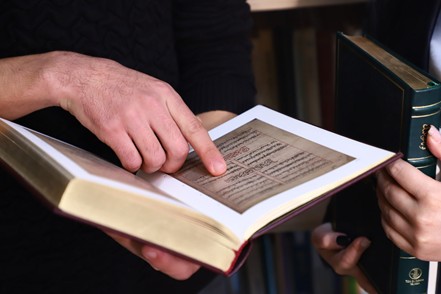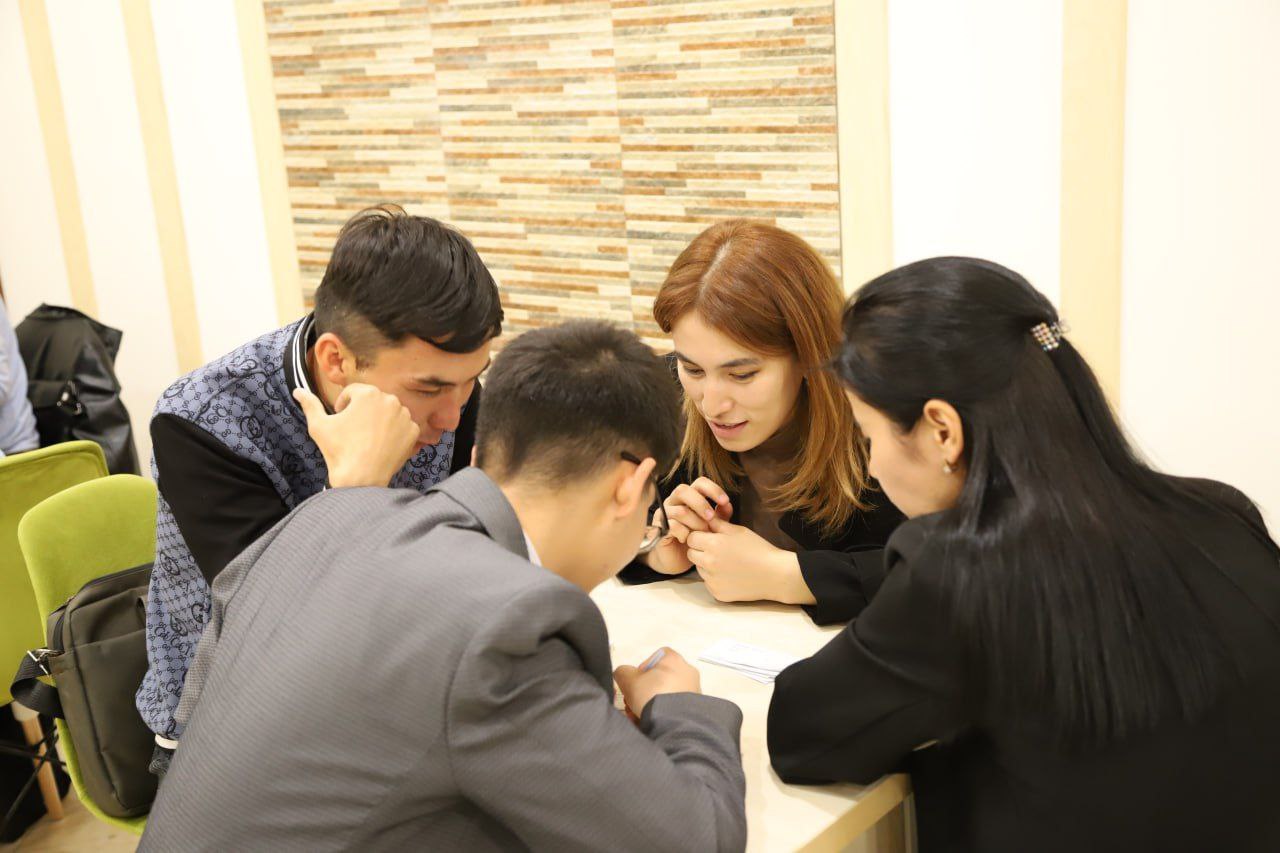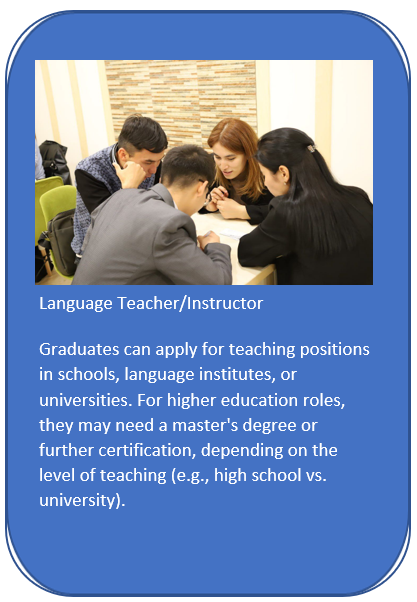This educational program specializes in training philologists and educators in the field of Uzbek language and literature. It also aims to prepare highly skilled specialists for various sectors, including: government administration bodies, scientific research institutes, mass media and publishing organizations, preschool institutions, general secondary and vocational educational institutions, both public and private educational organizations, as well as enterprises, institutions, and companies (firms), with expertise in philology and pedagogy (in both primary and secondary languages).
The curriculum includes subjects such as Uzbek linguistics, ancient Turkic languages, the history of the Uzbek language, Uzbek folklore, Uzbek dialectology, contemporary Uzbek literary language, the history and theory of Uzbek literature, textology, Navoi studies, and world literature. The educational process incorporates the core principles of specialization in these fields, including literary-periodical comparison, comparative methods, and an understanding of historical and cultural differences. Through practical sessions, students will have the opportunity to compare Uzbek literature with world literature from historical, comparative, and cultural perspectives.
Director of Academic Program
DSc Uzoq Jo‘raqulov; DSc, prof. Nurboy Jabborov, DSc, prof. Zulxumor Xolmanova
Study Mode
Four years full-time.
Program Structure
Qualification for this award requires the successful completion of 148 credit points including the subjects listed in the recommended sequence below.

Modular Learning
Launching in 2025
Alisher Navoi Tashkent State University of Uzbek Language and Literature (TSUULL) is set to introduce modular learning at the University starting in 2025, offering a flexible and innovative approach to education.

Master’s program in Folklore Studies and Dialectology Specialization
During the academic process, students will receive comprehensive information about the formation and spread of Uzbek folklore and dialects, their areal characteristics, the methodology (technology) of creating linguistic maps and an atlas of Uzbek folklore and dialects, the language and poetics of folk epics, ceremonial folklore, Uzbek myths and legends, children's folklore, the history of research on Uzbek dialects, the relationship between the literary language and dialects, and the sources of enrichment of the literary language. They will acquire both theoretical and practical training in these areas.
Flexible and Balanced Schedule
Classes are held on campus for five hours a day, five days a week, allowing you to balance studies with other commitments. Over the year, you’ll complete about 7 subjects. There are also online preparatory courses lasting
17 weeks, with one in-person class every two weeks, to help build your confidence and ease you into academic or professional life.
This course provides in-depth knowledge of computer systems, software development, and data management. It covers the following areas: programming, network administration, cybersecurity, database design,andartificialintelligence.
The focus of the course is on developing skills in speaking, reading, understanding texts, and translating in the Russian language.
Students are provided with the theoretical and historical foundations of modern pedagogical science, along with knowledge related to teaching techniques. The course emphasizes the rational organization of the educational process in line with the requirements of the Law of the Republic of Uzbekistan on "Education." It enables students to effectively apply pedagogical heritage, exhibit strong pedagogical culture and skills in practical settings, and develop the ability to efficiently manage educational and training processes. Additionally, the course explores the principles of organizing national and innovative pedagogical activities, managing educational processes, working with educational and regulatory documents, and understanding the laws and principles related to the assessment of educational achievement.
This course is designed to develop a foundational understanding of general psychological knowledge, focusing on the processes occurring within an individual that influence their interaction with events and phenomena in society. It aims to analyze the nature of common psychological phenomena, states, and processes in societal life, as well as to explore the factors influencing an individual's development. The course also emphasizes the analysis of emotional and volitional qualities, alongside the psychological characteristics that shape individual behavior. Students will gain an understanding of the influences affecting personal growth and the psychological traits that contribute to the formation of personality.
The examples of folk oral literature hold an important place in the spiritual life of the people as a syncretic art form. In it, the social, domestic, and cultural life of the Uzbek people over the centuries has found its artistic expression. The text aims to provide scientific and theoretical information about the examples of Uzbek folk oral literature, their genres and structure, and unique features. It also aims to introduce the examples of Uzbek folk oral literature, as well as develop skills in collecting and analyzing folklore samples.
This course provides knowledge about the history of documentation, specifically Eastern documentation, types of documents, and the basics of administration, as well as the language and styles used in documentation. The goal is to develop the skills to draft and edit any legal and regulatory documents written inthestatelanguage."
The Theoretical Linguistics course explores the origins and evolution of the field, the social nature and functions of language, various levels of language, and different branches of linguistics. It covers key linguistic terms, the history of linguistics, schools of thought, linguistic methods, universals, theories, and language structure. The course offers insight into the grammatical structure of language, the connection between language and society, language and thought, as well as linguistic and speech units, and the interrelations among different language elements.
This course explores the foundational literary-theoretical concepts, the structural components of literary studies, the laws of artistic creation, the poetics of literary types and genres, and the scientific-aesthetic criteria for the reception and interpretation of literary works."
This course aims to develop the skills to read texts related to Uzbek classical literature, study the old Uzbek script, and gain the ability to read the works of classical writers in the old Uzbek script."
The concept of world literature, along with its scientific and theoretical criteria, historical formation factors, periods, typological issues, and the relationship between commonality and individuality in Eastern and Western literature, is explored. The course examines the myths, oral and written literature, and genre characteristics of ancient Sumerian, Indian, Egyptian, Chinese, Turkish, Iranian, and Greek literatures. Students will gain theoretical knowledge about epic plots, compositional features, the historical foundations of character systems, the origins of dramatic genres, the poetic canons of ancient lyricism, the art of ancient novels, and their connections to epic and other genres. The essence of literary movements and creative methods is also studied. Additionally, the theoretical challenges in world literary history, key figures, development principles, masterpieces of world artistic thought, and their evolution are addressed. Students will become familiar with works by writers and poets from across the world, analyzing the universal and individual traits present in Eastern and Western cultures. The course develops skills in literary analysis, focusing on understanding the inner poetic structure and semantic relationships of artistic works. Students will also learn to distinguish concepts like the creative individual, individuality, and personal style, while interpreting the literary, historical, philosophical, and spiritual-cultural factors that shape world literature, including the relationship between myth and literature. The course encourages analysis of important literary periods that have played a significant role in the cultural and spiritual life of world nations.
This course explores the place of Uzbek classical literature in the history and development of our national culture, literary events, the formation and development of literary genres, the laws of development in historical-literary processes, and the connection with the social environment. It also covers the social-historical and literary-aesthetic factors in the formation of Uzbek literature during the period of national revival, the conditions and causes for the emergence of new literary-aesthetic thinking, and the specific characteristics of these processes."
This course introduces the formation, historical roots, dialectal basis, and the linguistic and extralinguistic factors that determine the development of modern Uzbek literary language. It equips students with theoretical knowledge in the sections of modern Uzbek literary language such as Phonetics and Phonology, Lexicology, Phraseology, Lexicography, Morphology and Word Formation, Morphology, and Syntax. The course also aims to help students apply theoretical knowledge to practice and develop the skills to appropriately and purposefully use Uzbek language units in speech."
This course covers the concepts of Uzbek dialectology, the phonetic, lexical, and grammatical features of the Kipchak, Karluk, and Oghuz dialects of the Uzbek language, as well as transcription characteristics. It also introduces the principles and methods of dialect classification."
This course explores the phenomenon of Alisher Navoi, his personality, life journey, intellectual genius, his contribution to the development of Uzbek language and literature, and the cultural advancement of the nation. It covers his scientific and creative activities, his place in the history of Uzbek statehood and spirituality, the history of the study of Navoiy's works, their content and essence, the distinctive features of his literary legacy, the stylistics of artistic prose, as well as the understanding of symbols, allegories, and characters. The course also addresses the language of Navoiy's works, the art of his Persian heritage, and the unique aspects of his scientific-philological, historical, mystical, and religious-philosophical writings. It delves into the layers of meaning in his works and the impact of his contributions on the subsequent development of both Uzbek and world literature."
The course investigates the historical development and evolution of the Uzbek language over several centuries, utilizing manuscript sources and existing scholarly publications. It delves into the phonetic, morphological, lexical, and syntactic features of the language, examining both theoretical and practical issues within the field of historical linguistics. The course addresses the classification of the different periods in the history of the Uzbek language, the study of Old Turkic literary language and its monuments, as well as the analysis of the Old Uzbek literary language and its written records. It also synthesizes information regarding the phonetic, lexical, and grammatical evolution of the language. Furthermore, the course explores the stages of the Uzbek literary language's formation and development, while also examining its interrelations with other Turkic languages, grounded in empirical data, thereby providing comprehensive scientific and theoretical knowledge.
This course focuses on the methods of teaching Uzbek language and literature, tracing the dynamics of the language's formation and development over several centuries. It explores manuscript sources from different periods and their physical materials found in existing publications, analyzing the phonetic, morphological, lexical, and syntactic characteristics. The course includes the analysis of theoretical and practical issues in historical linguistics, classification of the periods of Uzbek language history, the description of Old Turkic literary language and its monuments, as well as the analysis of Old Uzbek literary language and written sources in this language. It also covers the generalization of information on the phonetic, lexical, and grammatical development of Uzbek, the analysis of the stages of formation and development of the Uzbek literary language, and the study of its relationship with related Turkic languages based on factual material, providing scientific and theoretical knowledge. Additionally, it focuses on methods for teaching Uzbek language and literature effectively in the classroom."
This course explores the interconnection between national and universal literary-theoretical traditions, explaining the sequential development of cultural and economic progress in both the East and the West, and their mutual influence. It teaches the systematic understanding and analysis of literary movements and methods, historical development stages, as well as the common and typological aspects of national literature. The course includes the study and aesthetic analysis of key masterpieces from both the East and the West, explaining their significance in human life, and provides knowledge about the periods of world literature, its main figures, and epic, lyrical, and dramatic works. Students will gain skills in comparative study of world literature, focusing on the works of the East and Uzbek literature. They will learn to study world literary works as a whole, based on common poetic principles, and interpret national literature as a shared phenomenon with the artistic thought of other nations. Additionally, students will understand the biography, literary environment, poetic mastery, style, and artistic concepts of prominent figures in world literature."
This course provides information about the development stages, scientific directions, schools, and scientific paradigms in Uzbek linguistics. It also clarifies the influence of scientific schools from other languages on Uzbek linguistics."
This course focuses on the principles of development in the history of modern Uzbek literature, the factors and laws that shaped the literature of each period, and its distinctive characteristics. Students will gain knowledge and skills in understanding these features, as well as identifying the main directions of the development of Uzbek literature."
This course involves the analysis of issues in applied linguistics, the study of Old Uzbek literary language and written sources in this language, the generalization of information on the phonetic, lexical, and grammatical development of Uzbek, and the analysis of the stages of formation and development of the Uzbek literary language."
This program provides a solid foundation for successful professional activities in areas such as pedagogical and scientific-pedagogical work in educational institutions, translation, organizational management, journalism in mass media, publishing and editing, scientific research, consulting services, and mass communication. Graduates of the program will be able to effectively engage in pedagogical and scientific-pedagogical activities in educational institutions, organizational and managerial work, journalism, publishing and editing, scientific research, and consulting services.
Carrying out journalistic and editorial tasks in mass media, developing the skills to independently prepare articles, programs, and broadcasts, engaging in proofreading and editing activities for artistic and scientific works, as well as for industry-related brochures and monographs in the publishing and editing fields. Additionally, working as a translator or literary staff member in publishing institutions.
Conducting experiments on exemplary methods and other topics as a junior researcher or investigator in philology research institutes, processing the results of these experiments. Carrying out experimental research on exemplary methodologies and innovative teaching methods, developing recommendations based on their results. Preparing scientific research papers, participating in the expert review of field literature, writing articles and reviews for specialized journals, and addressing professional activity issues as part of a scientific research and educational institution team.
Being able to conduct expert evaluations of projects, sources, literature, and electronic video and audio products related to the relevant field, providing consulting services in areas that align with the specialization. The ability to give a systematic and functional description of languages with varying usage scopes in the country, and the skill to analyze current and historical literary processes as well as artistic works of different genres in professional activities.
Career Opportunities
Pedagogical and Scientific-Pedagogical Activities in Educational Institutions:
Using modern information and pedagogical technologies to conduct non-traditional learning sessions, preparing and formalizing the necessary educational-methodical documents for conducting lessons in the taught subjects, and utilizing didactic tools for teaching in the respective subject areas.
OrganizationalandManagerialActivities:
Developing and implementing processes to manage the quality of philological activities, expressing and scientifically justifying one's opinion on matters related to spiritual, national, and universal values, having a life perspective based on the idea of national independence, organizing and managing various events, conferences, and educational discussions related to the mother tongue, creating and utilizing information technology systems in ARM (Automated Information Systems), monitoring processes related to their use, and developing mechanisms to assess their quality, as well as organizing and managing social, spiritual, and educational activities within a team.


Indicative annual fee
$2000*
This indicative annual fee is based on one year study load of 20subjects (68 credit points)
If you are a domestic student, you can apply through our TSUULL Application system which is free of charge.
Domestic students are:
• Uzbekistan citizens
• Karakalpagistan Republic Citizens
• Uzbekistan permanent residents
• Karakalpagistan Republic permanent residents
At Alisher Navo’i Tashkent State University of Uzbek Language and Literature, we are proud to offer a range of scholarships that acknowledge students with a deep commitment to the Uzbek language, literature, and culture. Our scholarships reward those who demonstrate academic excellence, active engagement within their communities, and outstanding leadership. Through donor-funded support, we also ensure that scholarships are accessible to students based on their academic achievements and financial needs. Additionally, specific scholarships are available for degrees in translation, linguistics, and Uzbek literature, fostering excellence and dedication to advancing Uzbek language and literature studies.
1. How long is the Bacholer’s program?
Bachelor's Degree: Typically takes 3-4 years to complete, depending on the country and the program.
2. How are assessments conducted?
Assessment in TSUULL's bachelor’s programs is diverse and may include exams, portfolios, project work, fieldwork, and practical tasks. The programs focus on authentic assessments to reflect real-world applications, with many tasks designed to develop essential skills like critical thinking, research, and time management. Additionally, teachers offer individual support through small, interactive classes, ensuring students have ample guidance throughout their studies.
3.What career opportunities are available after graduation?
A TSUULL Bacholer’s degree opens doors to careers in education, Language Teacher/Instructor, Linguist/Language Researcher Editor/Proofreader, and more. Graduates often find roles in translation and interpretation, publishing, media, and tourism, with their language skills and cultural knowledge highly valued by employers worldwide.
4. Are there scholarships available for foreign students?
Yes, TSUULL offers scholarships for international students based on academic performance and other achievements. Students interested in scholarships should apply early and check with the admissions office to understand the specific requirements and availability.
5.Does TSUULL offer internship or study abroad opportunities?
TSUULL has partnerships with universities and institutions abroad, allowing students to participate in exchange programs and internships. These opportunities provide valuable experience in different cultural and linguistic settings, often aligning with students’ studies and future career goals.
TSUULL has been included in the QS World University Rankings 2025, earning a spot in the 301–350 range in the Modern Languages category.
This recognition reflects the university’s strong performance in areas such as academic reputation, employer opinion, research output, and international collaboration.